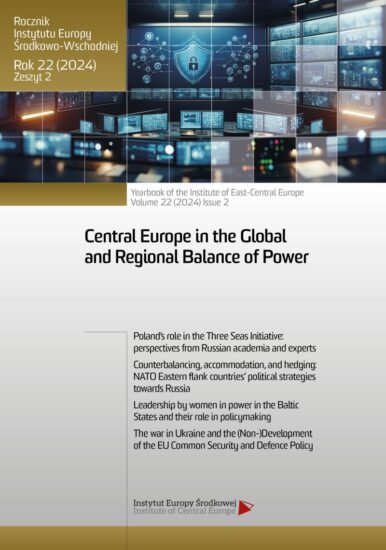Dyplomacja ekonomiczna Republiki Czeskiej wobec globalnych wyzwań
ORCID: Anna Szczepańska-Dudziak: 0000-0003-4596-0956
Afiliacja: Uniwersytet Szczeciński
Pages: 129-145
Edition: Lublin 2024
DOI: https://doi.org/10.36874/RIESW.2024.2.7
Citation method: A. Szczepańska-Dudziak, “Czechia Team”. Economic diplomacy of the Czech Republic in the face of global challenges, „Rocznik Instytutu Europy Środkowo-Wschodniej” 22 (2024), z. 2, s. 129-145 DOI: https://doi.org/10.36874/RIESW.2024.2.7
Abstract: The purpose of this article is to show the evolution of the Czech Republic’s economic diplomacy model from the systemic transformation in the 1990s to the present day. Using a case study and descriptive analysis method, the author analysed government documents shaping foreign policy and the state’s pro-export strategy. The economic conditions and the will of policymakers, who understood the need to take measures to support Czech exports and create an integrated system of economic diplomacy, were taken as the starting point for the considerations undertaken. In addition, it was necessary to find an answer to the question of the determinants that caused the modification of objectives and the introduction of a component of scientific diplomacy and development aid and led to measures for the territorial diversification of exports of goods and Czech investments towards non-European markets. The Czech Republic is the best-industrialised country in Central and Eastern Europe, a stable and open-to-the-world economy, focused on the markets of the European Union countries with ambitions to inspire technology and innovation in industry. Additional analysis of the research material, found on the websites and portals of state institutions and specialised agencies, allows us to conclude that the hallmark of the Czech model of economic diplomacy is its ability to respond quickly to crisis situations such as COVID-19 as well as its transparency, including in the sphere of spending funds, and its commendable use of digital diplomacy, including social media, to conduct outreach and promotional activities.
Bibliography:
1. Aleksandr Baunow – o rossijskoj dipłomatii i itogach putinizma, Polit.ru, 19 December 2023, https://polit.ru/articles/konspekty/aleksandr-baunov-o-rossiyskoy-diplomatii-i-itogakh-putinizma/ [8.04.2024].
2. Bogomolov A., Lytvynenko O., A Ghost in the Mirror: Russian Soft Power in Ukraine, Chatham House, January 2012, https://www.researchgate.net/publication/263853878_A_Ghost_in_the_Mirror_Russian_Soft_Power_in_Ukraine_The_Aims_and_Means_of_Russian_Influence_Abroad_Series_A_Ghost_in_the_Mirror_Russian_Soft_Power_in_Ukraine [8.04.2024].
3. Chrzanowski B., An Episode of Existential Uncertainty: The Ontological Security Origins of the War in Donbas, “Texas National Security Review” 2021, vol. 4, no. 3, pp. 11–32.
4. Dawson G., Smith N.R., Why Putin’s invasion of Ukraine had to happen, ECPR – The Loop, https://theloop.ecpr.eu/why-putins-invasion-of-ukraine-had-to-happen/ [8.04.2024].
5. Götz E., Putin, the State, and War: The Causes of Russia’s Near Abroad Assertion Revisited, “International Studies Review” 2017, vol. 19, no. 2, pp. 228–253.
6. Hansen F.S., Russia’s Relations with the West: Ontological Security through Conflict, “Contemporary Politics” 2016, vol. 22, no. 3, pp. 359–375.
7. Kazharski A., Civilizations as Ontological Security?: Stories of the Russian Trauma, “Problems of Post-Communism” 2020, vol. 67, no. 1, pp. 24–36.
8. Krickovic A., Sakwa R., War in Ukraine: The Clash of Norms and Ontologies, “Journal of Military and Strategic Studies” 2022, vol. 22, no. 2, pp. 89–109.
9. Mearsheimer J.J., The Causes and Consequences of the Ukraine War, CIRSD, 16 June 2022, https://www.cirsd.org/en/horizons/horizons-summer-2022-issue-no.21/the-causes-and-consequences-of-the-ukraine-war [8.04.2024].
10. Mearsheimer J.J., The Tragedy of Great Power Politics, London–New York 2001.
11. Mitzen J., Larson K., Ontological Security and Foreign Policy, Oxford Research Encyclopaedia of Politics, August 2017, https://doi.org/10.1093/acrefore/9780190228637.013.458 [8.04.2024].
12. Mitzen J., Ontological Security in World Politics: State Identity and the Security Dilemma, “European Journal of International Relations” 2006, vol. 12, no. 3, pp. 341–370.
13. Narozhna T., Revisiting the Causes of Russian Foreign Policy Changes: Incoherent Biographical Narrative, Recognition and Russia’s Ontological Security-Seeking, “Central European Journal of International & Security Studies” 2021, vol. 15, no. 2, pp. 56–81.
14. Our experts decode the Putin speech that launched Russia’s invasion of Ukraine, Atlantic Council, 22 February 2022, https://www.atlanticcouncil.org/blogs/new-atlanticist/markup/putin-speech-ukraine-war/ [8.04.2024].
15. Putin V., On the Historical Unity of Russians and Ukrainians, Kremlin.ru, 12 July 2021, http://en.kremlin.ru/events/president/news/66181 [8.04.2024].
16. Russia’s proposal to redraw European security “unacceptable,” U.S. says, Radio Free Europe. Radio Liberty, 17 December 2021, https://www.rferl.org/a/nato-russia-security-guarantees/31614168.html [8.04.2024].
17. Ryan K., Russia’s search for ontological security and the Ukraine Invasion, “Australian and New Zealand Journal of European Studies” 2023, vol. 15, no. 1, pp. 82–93.
18. Sakwa R., Russian Politics and Society. Fifth Edition, Routledge 2021.
19. Smith N.R., Assessing the Trajectory of West-Russia Relations in Eastern Europe: Gauging Three Potential Scenarios, “Global Policy” 2017, https://mpra.ub.uni-muenchen.de/84684/1/MPRA_paper_84684.pdf [8.04.2024].
20. Smith N.R., Dawson G., Mearsheimer, Realism, and the Ukraine War, “Analyse & Kritik” 2022, vol. 44, no. 2, pp. 175–200.
21. Speech and the Following Discussion at the Munich Conference on Security Policy, Kremlin.ru, 10 February 2007, http://en.kremlin.ru/events/president/transcripts/24034 [8.04.2024].
22. Stepanenko K., Kagan F.W., Bugayova N., Weakness is Lethal: Why Putin Invaded Ukraine and How the War Must End, Institute for the Study of War 1 October 2023, https://understandingwar.org/sites/default/files/Weakness%20is%20Lethal%20Why%20Putin%20Invaded%20Ukraine%20and%20How%20the%20War%20Must%20End%20PDF.pdf [8.04.2024].
23. Timofiejev I., Wojna Rossii i Ukrainy: bazowyj scenarij?, Valdai, 25 November 2021, https://ru.valdaiclub.com/a/highlights/voyna-rossii-i-ukrainy-bazovyy-stsenariy/[8.04.2024].
24. von Essen H., Danielson A., A Typology of Ontological Insecurity Mechanisms: Russia’s Military Engagement in Syria, “International Studies Review” 2023, vol. 25, no. 2, pp. 1–25.

PDF: Download